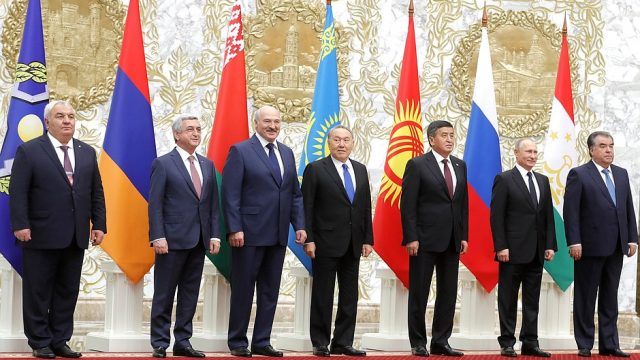Minsk, Belarus: Although the Agenda of Collective Security Council of the Collective Security Treaty Organization (CSTO) meeting in Minsk on Thursday revolved around Nagorno-Karabakh conflict settlement and Syrian crises, the issue of on-going Afghan civil war also came under discussion.

Further information regarding discussion on Syria, Afghanistan and Nagorno-Karabakh conflict are awaited till the filing of this report. According to information available, the issue of Afghan war and its impact on Central Asia was explained in detail by President of Kazakhstan Nursultan Nazarbayev.
CSTO has decided to launch a special operation against Islamic State also known as Daesh under the title of “Operation Mercenary” in 2018. CSTO Deputy Secretary General Valery Semerikov stated that CSTO states are aware that their citizens are engaged in terrorism in the territory of Syria and Afghanistan and they (terrorists) would not allow to bring terrorism in their countries of origins.
Host President Alexander Lukashenko said to media that leaders of CSTO member-countries see eye-to-eye on threats being faced by the member-countries and discussed strategies to minimize their (threats) consequences.
Presidents of Armenia, Belarus, Kazakhstan, Kyrgyzstan, Russia, and Tajikistan gathered in Minsk to discuss the current situation in the world and how the CSTO countries can protect the world from terrorism and conflicts.
According to available information, presidents of the participating countries exchanged views on the current issues of international and regional security, and the situation in the Korean Peninsula, Nagorno-Karabakh, Afghanistan and Syria.
It is reported in state run media of Belarus that 20 issues were on agenda including ways of improving the military component of the organization, the structure of the CSTO Secretariat and the Joint Staff, distribution of quotas for the posts in the Joint Staff and 2018 CSTO budget.
Leaders signed a document for supporting the mediation efforts of the OSCE Minsk Group on the Nagorno-Karabakh settlement, on joint measures to strengthen the defence capability of the CSTO member states, on the implementation plan for the CSTO Collective Security Strategy through 2025, and on improving measures to counter illegal migration. In addition, the leaders signed agreements on sharing information, security cooperation and approved the CSTO emblem and flag.
Goals of CSTO include strengthening peace, international and regional security and stability, and defending the independence, territorial integrity and sovereignty of member states on a collective basis, primarily by political means.





